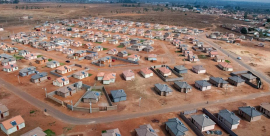
The City of Ekurhuleni, in consultation with the Gauteng Department of Human Settlements, has prepared a housing allocation plan following the delivery of 152 housing units completed for allocation under the Leeuwpoort Mega Project.
Spokesperson for the city, Zweli Dlamini, said the Leeuwpoort Mega Project, which was launched in 2017, will yield a total of 22 000 housing units.
Mkhize said an all-inclusive housing registration plan was implemented in 2017 immediately after the launch to enable potential beneficiaries to register and update their personal details on the National Housing Needs Register (NHNR).
“The programme was implemented wholly in the city’s Southern Region and it covered the whole of Kathorus and Boksburg areas, including Reiger Park residents, and all other affected communities,” Mkhize said.
He said the implementation of the housing allocations programme will target wards 42, 43,32, 34 and 93, including residents of Cinderella Hostel, Central Hostel and communities from Hlahane and Crossroads informal settlements.
“For now, the allocation is prioritising the two hostels that are in the way of the project, which, if not demolished, contractors will not be able to proceed with the rest of the construction of the 22 000 mixed development housing yield.
“Also included as beneficiaries of the project is the community of Hlahane and Crossroads informal settlement. These communities are staying in an area that is not habitable,” Mkhize said.
He said the communities of Ward 33, which include Delmore, Delmore Gardens, Angelo and others, will not benefit from the Leeuwpoort project, as “they are earmarked to benefit from the Comet Ext 17 project”.
“Communities are assured that all approved beneficiaries for this first phase are sourced from the National Housing Needs Register. These are people who have never benefited before and no illegal foreign nationals are considered.
“People who applied for housing during 1996 – 1999, people with disabilities, applicants whose subsidy applications were previously approved but do not have houses or serviced residential sites, the aged and child-headed households living within the aforementioned areas are given priority, as per the housing allocations policy,” Mkhize explained. – SAnews.gov.za


